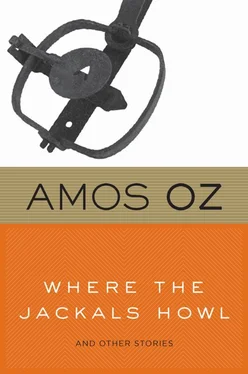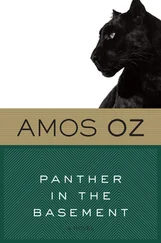Amos Oz - Where the Jackals Howl
Здесь есть возможность читать онлайн «Amos Oz - Where the Jackals Howl» весь текст электронной книги совершенно бесплатно (целиком полную версию без сокращений). В некоторых случаях можно слушать аудио, скачать через торрент в формате fb2 и присутствует краткое содержание. Год выпуска: 2012, Издательство: Houghton Mifflin Harcourt, Жанр: Современная проза, на английском языке. Описание произведения, (предисловие) а так же отзывы посетителей доступны на портале библиотеки ЛибКат.
- Название:Where the Jackals Howl
- Автор:
- Издательство:Houghton Mifflin Harcourt
- Жанр:
- Год:2012
- ISBN:нет данных
- Рейтинг книги:4 / 5. Голосов: 1
-
Избранное:Добавить в избранное
- Отзывы:
-
Ваша оценка:
- 80
- 1
- 2
- 3
- 4
- 5
Where the Jackals Howl: краткое содержание, описание и аннотация
Предлагаем к чтению аннотацию, описание, краткое содержание или предисловие (зависит от того, что написал сам автор книги «Where the Jackals Howl»). Если вы не нашли необходимую информацию о книге — напишите в комментариях, мы постараемся отыскать её.
Where the Jackals Howl — читать онлайн бесплатно полную книгу (весь текст) целиком
Ниже представлен текст книги, разбитый по страницам. Система сохранения места последней прочитанной страницы, позволяет с удобством читать онлайн бесплатно книгу «Where the Jackals Howl», без необходимости каждый раз заново искать на чём Вы остановились. Поставьте закладку, и сможете в любой момент перейти на страницу, на которой закончили чтение.
Интервал:
Закладка:
Gilead fixed his gray eyes on the other woman’s son and stared at him long and hard. He could not recall why he had sent for him at night, or why the dogs were barking outside in the dark. At the end of his silence Gilead said:
“My son, I am told that you pass your hand through the fire and that you do not cry out when you do it.”
Jephthah said:
“That is the truth.”
Gilead said:
“And why should you do such a wrong and painful thing?”
Jephthah said:
“To prepare myself, Father.”
“Prepare yourself for what?”
“I do not know for what.”
As Jephthah spoke to his father he looked at the broad, rough hand that rested heavily on an earthen tray. At the sight of his father’s hand his own pale, thin hand filled with fear and longing. Perhaps he imagined that his father might speak to him lovingly. Perhaps he imagined that his father might ask for his love. At that moment, for the first and only time in his whole life, Jephthah suddenly yearned to be a woman. And he did not know what. In the brazier the fire blazed and sparks of firelight glowed dully on the bronze weapons hanging on the walls, and in the lord’s eyes, too, a certain spark gleamed.
Gilead said in a whisper:
“Very well, put your hand in the fire and let us see.”
Jephthah looked entreatingly into his father’s face, but Gilead the Gileadite’s face was hidden in the flickering light and shadow, for the tongues of fire in the brazier were darting restlessly hither and thither. The boy said:
“My father’s word is my command.”
Gilead said:
“Put your hand in now.”
Jephthah said:
“If you will love me.”
As he put out his hand his teeth showed as if he were laughing, but Jephthah was not laughing.
Suddenly his father shouted:
“My son, do not touch the fire. That is enough.”
But Jephthah did not want to hear, and he did not avert his eyes. The fire touched the flesh, and beyond the fence the desert stretched to the most distant hills.
After this episode Gilead said to Jephthah his son:
“You are tainted as your father is tainted. And yet I cannot bring myself to hate you.”
Then the lord poured wine from the earthen pitcher into two rough cups and said:
“Jephthah, you will take wine with me.”
And because neither the man nor the boy could trust words or liked words, half the night passed before either of them spoke another word.
Finally Gilead rose to his feet and spoke.
“Now, my son, go. Do not hate your father and do not love him. It is an ill thing that we must be each of us son to a father and father to a son and man to a woman. Distance upon distance. Now, don’t stand there staring. Go.”
4
AFTER THESE things it sometimes happened that father and son rode out together toward dawn in the open country. They would cross the bed of the ravine and mount the slope that led up to the expanse of broad sands, and very slowly, as though riding in a dream, they would traverse the parched plateau. Stubborn, forlorn shrubs sprouted here and there among the crevices of the rock. They seemed less like plants than like the loins of the barren boulders. A baneful white light beat mercilessly down. When they had ridden far away, a fitful conversation might flare up between them.
Gilead might say:
“Jephthah, where do you want to go.”
And Jephthah, his eyes narrowed against the brutally blazing light, would reply, after a silence:
“To my own place. Home.”
Then Gilead, with a hint of a smile fleeting across his stony face, would ask:
“Well, why don’t we turn around and ride for home.”
And Jephthah, himself almost smiling, his voice remote and abstracted:
“That is not my home.”
“Then where is your home, what home do you want to go to.”
“That, Father, is what I do not yet know.”
After this exchange, silence would close in once more. But now they were both within the same silence and not in two separate silences. The boy would be full of love, and lovingly he would stroke his horse’s mane. Once, when they came to the valley of black basalt, he asked his father:
“What is the desert trying to say, what thought is the wasteland, why does the wind come and why does it suddenly drop, with what sense must a man hear the thronging sounds, and with what sense may he hear the silence?”
To which Gilead replied:
“You for yourself. I for myself. Every man for himself.”
And after a moment he added, this time with a shadow of compassion in his voice:
“There is a lizard. Now it has gone.”
And with that they both relapsed into their shared silence.
As they rode back to the farm, Gilead the Gileadite might stretch out his broad, rough hand and suddenly hold his son’s bridle for a moment or two. And they rode close together.
Then he would let go as they came through the fence. Jephthah would be dismissed to join the other youngsters in the farmyard, while Gilead would go into the house.
During the last winter Pitdah sometimes came to Jephthah’s bedroom at night. Barefoot, she would come and sit on the edge of his bed, whispering spells. She was given to laughing suddenly, a soft, warm laugh, until the boy could no longer contain himself and laughed along with her, without making a sound. Or else she would sing him gentle Ammonite songs about the vast expanses of water or the buck in the vineyards or about suffering and grace.
She would take his hand in hers and draw his fingers slowly up her arm slowly over her shoulder slowly around her soft neck. And she would entice him to Milcom god of pleasure, whispering rapid strange words, the secret of his own flesh and everything of which flesh was capable. And she also entreated him to flee from the desert to the places of shade and water before the desert succeeded in parching his blood and his flesh.
Jephthah had never set eyes on the sea in his life, he did not know its smell or the sound of its waves in the night, but he called his mother, Sea, sea.
One night, after she had left him, Jephthah had a dream. The bald, shriveled steward came and sheared a ewe closely, then sheared her again until her skin showed pink and sickly, crisscrossed with countless veins, and the servant sheared her yet again and slaughtered the ewe, not by the throat but by the belly, and black blood gushed and bubbled and stuck to Jephthah’s skin in his dream and then God came heavy and iron-shouldered clad in a bearskin and he was hot and parched. On a carpet of vine leaves Milcom lay wrapped in silk and jewels, and Jephthah saw God force his way into the silk as a ram forces his way with bloodshot eyes into a ewe stooping submissively as if stupefied by the powerful rage unleashed against her.
Jephthah woke from this bad dream drenched in sweat. He opened his eyes and lay trembling feverishly and saw darkness, and he closed his eyes and again saw nothing but darkness and he started to whisper a prayer which he had learned from the household priest and still he saw darkness and he tried singing his mother’s songs but still the darkness did not release him and he lay on his bed as though petrified because he imagined that while he was dreaming they had all, his father and mother, the priest and the maidservants, the sheep and the shepherds and his stepbrothers and the farmdogs and even the wandering nomads outside, been carried off dead and he was left all alone by himself and outside in the dark the desert stretched to the ends of the earth.
One night at the end of that winter Pitdah died. The maidservants said, The Ammonite whore has died by her sorcery. So she was buried on the following day in the plot reserved for outcasts.
On the horizon at the end of the plain that morning a gray sandstorm rose up tall and furious in the distance, and all the air was filled with dust and the smell of a gathering tempest. All the land was covered with a fine ash. And meanwhile the household priest tossed earth onto the dead woman’s grave and uttered a dark oath: Leave us now and go to the accursed place from which you were taken and do not return to us either in the dark or in a dream, lest the curse of God pursue you even in your death and the demons of destruction hound you. Go, go, accursed one, go and never return, and let us have rest. Amen.
Читать дальшеИнтервал:
Закладка:
Похожие книги на «Where the Jackals Howl»
Представляем Вашему вниманию похожие книги на «Where the Jackals Howl» списком для выбора. Мы отобрали схожую по названию и смыслу литературу в надежде предоставить читателям больше вариантов отыскать новые, интересные, ещё непрочитанные произведения.
Обсуждение, отзывы о книге «Where the Jackals Howl» и просто собственные мнения читателей. Оставьте ваши комментарии, напишите, что Вы думаете о произведении, его смысле или главных героях. Укажите что конкретно понравилось, а что нет, и почему Вы так считаете.












